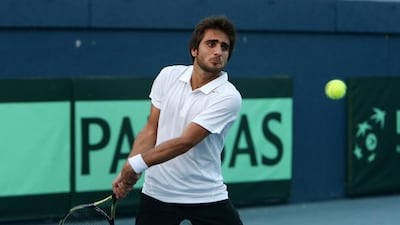DUBAI // The UAE are looking forward to a more concerted bid for a place in the Davis Cup’s Group II next year after failing to take their chances at home this week.
The UAE blanked neighbours Oman 3-0 in their first tie of the relegation play-offs on Saturday night to keep their place in Group III of the Davis Cup Asia/Oceania region, but the hosts had the opportunity to make it to the promotion play-offs after a winning start to their group campaign.
They beat Pacific Oceania 2-1 in their opening Pool B tie and were just two games away from booking their place in the promotion play-offs as Omar Al Awadhy led Cambodia’s Kenny Bun 6-4, 4-2 after Hamad Al Janahi had won the opening singles.
Al Awadhy then picked up a side strain and, severely hampered by the injury, went on to lose the match.
Cambodia then took the doubles to dash UAE’s hopes.
The UAE also had their chances in their final group game against Vietnam but lost 3-0.
Al Awadhy regretted not being able to help his team’s cause, though he continued to play with the injury and beat Oman’s Khalid Al Nabhani 6-3, 6-1 in Saturday’s second singles after Al Janahi had defeated Mohammed Al Nabhani 7-6, 4-6, 6-2 in the opening match.
“I feel disappointed that I have not been able to produce my best tennis and help my country,” Al Awadhy said. “I have been playing at less than 70 per cent because of the injury.
“But still, there are a lot of positives we can take from here. These matches have shown that there is not a big difference between us and the Vietnams and Malaysias.
“More importantly, we know what we need to do against these opponents.
“So when the next round is played in April, I believe we will be ready and we will be a much stronger side.”
arizvi@thenational.ae

